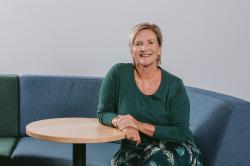Have you noticed a shift in the language we’re using in business? Have you noticed an emphasis on feelings and being authentic? Have you noticed that employees at all levels need more than just a job that pays salaries or wages? Yes, I certainly have.
Over the last couple of years, I’ve really seen a change in the way we “do” business. Thankfully, for the better. It feels that we needed this sea change during the latest industrial revolution. More latterly, after significant world events that have rocked our own communities, human beings really want us to be more “human” and more “vulnerable”.
With that in mind, I started reading some great research on vulnerability as, in my experience when I talked with senior executives or managers at all levels, the emotion of vulnerability is seen as the last bastion of weakness. Of course, vulnerability is scary – but it’s also a powerful and authentic way to live. According to author Brené Brown, in her book Daring Greatly, “vulnerability is the core, the heart, the centre, of meaningful human experiences”. Brown defines vulnerability as “uncertainty, risk and emotional exposure”.
Vulnerability is hard. What can make it even harder are the inaccurate assumptions we hold about it – and even more disconcerting is the impression that you certainly can’t talk about vulnerability in a business environment! Brown shatters the following three myths in Daring Greatly:
Vulnerability is a weakness – according to Brown, the funny thing about vulnerability is that we love when others are open and honest with us. But when it comes time for us to share, we sort of freak out. Suddenly, our vulnerability is a sign of weakness. Brown describes vulnerability as the core of all emotions. “To feel is to be vulnerable,” she says. So, when we consider vulnerability to be a weakness, we consider feeling one’s emotions to be so, too, she says. But being vulnerable connects us with others. It opens us up to love, joy, creativity and empathy, she says.
Some people don’t experience vulnerability – being vulnerable isn’t the choice we have to make. But when we do, Brown writes, we typically turn to behaviours that don’t align with who we want to be. It’s a bit like a self-fulfilling prophecy. Have you ever thought, hey things are going well in my life, and then you have a pang of horror that something bad will happen? Brown describes this as “foreboding joy”. We all experience vulnerability.
Vulnerability means spilling secrets – many of us are likely to assume that being vulnerable means spilling our hearts to strangers or wearing our secrets on our sleeves. But according to Brown, vulnerability embraces boundaries and trust and that vulnerability is about sharing our feelings and our experiences with people who have earned to right to hear them. It’s certainly not sharing everything with everyone! Being vulnerable takes courage. But it’s worth it. Being human means just that – the value in being yourself, to connect with others and to share yourself with your world.
After reading Brown’s book I started to think about the application in a business setting. I always thought opening up about my feelings at work made me weak. I never used to talk about my true feelings, often just bottling them up inside – I’m sure many of you reading this can relate. What I have discovered in life and business over the years is that feelings are our friends, not our enemy, and the more we understand about our feelings, the stronger we become. Not weaker.




